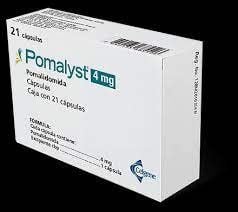This is an automatically translated article.
Pomalyst is a thalidomide analog, indicated, in combination with dexamethasone, for the treatment of patients with multiple myeloma who have received at least two prior therapies, including lenalidomide and a proteasome inhibitor.
1. What is Pomalyst?
Pomalyst has the main ingredient Pomalidomide, used to treat certain types of cancer (such as multiple myeloma, Kaposi's sarcoma) in the following cases:
In combination with dexamethasone for patients with multiple myeloma who have received received at least two prior therapies, including lenalidomide, a proteasome inhibitor, and demonstrated disease progression within 60 days of completion of treatment. Persons with AIDS-related Kaposi sarcoma after failure of highly active antiretroviral therapy (HAART) or in HIV-negative patients with Kaposi sarcoma.
2. Contraindications of Pomalyst
Pomalyst is contraindicated in the following cases:
Pregnancy: Pomalyst can harm the fetus and is contraindicated for pregnant women. If a woman becomes pregnant while taking this medicine, the patient should be warned of the possible risk to the unborn baby. Hypersensitivity: Pomalyst is contraindicated in patients who have experienced severe hypersensitivity (eg, angioedema or anaphylaxis) to pomalidomide or any of the excipients.
3. How to use Pomalyst
Pomalyst is only used according to Pomalyst REMS (Pomalyst Risk Assessment and Reduction Strategy) guidelines to prevent possible fetal exposure to the drug.
Take this medication by mouth as directed by your doctor, usually once daily for 21 days, then stop taking it for 7 days. This is a treatment cycle. Swallow the capsule whole with water. Do not open, break, crush or chew the capsules or handle them more than necessary.

Pomalyst chỉ được sử dụng theo hướng dẫn của Pomalyst REMS
4. Pomalyst . side effects
Possible side effects when using Pomalyst such as: Low blood cell count, unusual tiredness or weakness, nausea, back pain, increased risk of blood clots, neurological disease, inflammation upper respiratory tract, pneumonia, constipation, diarrhea, fever, dizziness, confusion, difficulty breathing.
Pomalidomide may decrease the function of the bone marrow, leading to a decrease in the number of blood cells such as red blood cells, white blood cells, and platelets. This can cause anemia, reduce the body's ability to fight infections, or cause easy bruising and bleeding. Get medical help right away if you have any symptoms such as unusual tiredness, pale skin, easy bruising or bleeding, signs of infection.
Pomalidomide may cause unwanted effects due to the rapid destruction of cancer cells (tumor lysis syndrome). To reduce this risk, your doctor may prescribe an additional medication and ask you to drink plenty of fluids.
5. Precautions when using Pomalyst
Before taking Pomalyst, tell your doctor if you are allergic to it or any other allergic condition. Also, tell your doctor if you have a history of kidney disease, liver disease, heart disease, blood clots, or stroke. Pomalidomide can cause serious birth defects or death in an unborn baby if taken during pregnancy. Therefore, women must use 2 reliable forms of birth control or avoid sex for 4 weeks before and after treatment. If you become pregnant or think you may be pregnant, stop taking pomalidomide and tell your doctor right away. Tell your doctor if you have missed your period or have unusual vaginal bleeding. Many drugs are excreted in breast milk and adverse reactions occur in the infant. Therefore, women should not breast-feed during treatment with Pomalyst. Men taking pomalidomide must use a condom every time they have sex with a female friend, even after a vasectomy. If your partner becomes pregnant or thinks she might be pregnant, tell your doctor right away. Men should also not perform sperm donation during treatment and for at least 4 weeks after stopping treatment, because pomalidomide can pass into semen. Although it is uncertain, pomalidomide can form very serious blood clots (such as heart attack, stroke, blood clots in the legs and lungs). Get medical help right away if you develop symptoms of a blood clot such as pain in your chest, jaw, or left arm; unusual sweating; weakness on one side of the body; vision changes; difficulty speaking and breathing; sudden pain, swelling, redness in the groin and calf. Your doctor may prescribe you blood-thinning medications to prevent blood clots. Do not donate blood during and for at least 1 month after stopping treatment with Pomalyst. If you forget to take a dose and it has not been 12 hours since your usual dose, take it as soon as you remember. If it has been more than 12 hours since your usual dose, skip the missed dose and take it on your regular schedule.
6. Drug interactions
Inform your treating doctor about all the medicines you take, including prescription and over-the-counter, vitamins, and herbal supplements. Pomalyst and other medicines can affect each other, causing serious side effects. Talk to your healthcare provider before taking any new medication. Tell your doctor or pharmacist if you are taking medicines that can cause dizziness such as antihistamines (diphenhydramine), sleeping or anxiety medications (alprazolam), muscle relaxants, and opioid pain relievers (codeine). Double-check the ingredients of all your medicines (such as allergy or cough-and-cold medicines) as they may contain ingredients that cause dizziness. In summary, Pomalys t is a thalidomide analog, indicated, in combination with dexamethasone, for the treatment of patients with multiple myeloma who have received at least two prior therapies. To use the drug effectively and safely, the patient should take it as prescribed by the doctor.
Please dial HOTLINE for more information or register for an appointment HERE. Download MyVinmec app to make appointments faster and to manage your bookings easily.
References: webmd.com, pomalystrems.com













